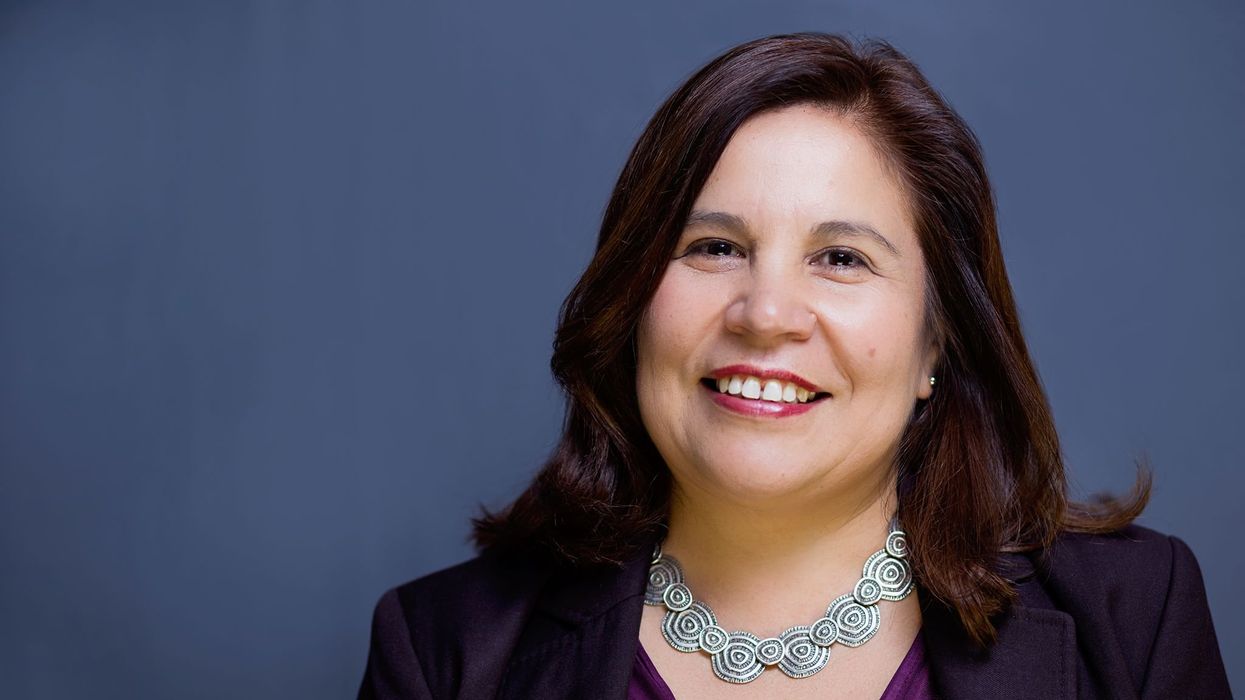Angelica Salas has long been a leading advocate for immigrant rights in Los Angeles. Since becoming Executive Director of the Coalition for Humane Immigrant Rights of Los Angeles (CHIRLA) in 1999, she has transformed the organization into one of the most powerful immigrant-led advocacy groups in the country. Her leadership has redefined what grassroots organizing can look like, mobilizing communities around issues ranging from Deferred Action for Childhood Arrivals (DACA) to voter outreach and legal services.
Salas’s journey into activism is deeply personal. Born in Durango, Mexico, she arrived in the United States at the age of five, undocumented, to reunite with her parents who had migrated for work. Growing up in Pasadena, California, her family lived in the shadows of deportation until they were able to legalize their status. In 2008, Salas became a U.S. citizen, adding a powerful chapter to a story she shares with many of the people CHIRLA serves. Her own experience navigating the U.S. immigration system informs her commitment to building dignity, not dependency, in the immigrant rights movement. After graduating from Occidental College with a degree in history and sociology, Salas joined CHIRLA in 1995 and became its executive director just four years later.
“She started as a receptionist at the office,” said Jorge Mario Cabrera, CHIRLA’s longtime communications director. “She’s been at CHIRLA for more than 28 years and has been our executive director for more than 20 years.” Her rise through the organization mirrors the values she champions—equity, persistence, and resilience.
Since then, her work has led to major policy victories in California. Under her leadership, CHIRLA played a pivotal role in securing in-state tuition and access to financial aid for undocumented students, as well as expanding driver’s licenses to undocumented Californians. But her vision went beyond legislative reform. She helped launch the organization’s day laborer job centers, which became models adopted nationwide.
She transformed the organization’s model into a powerhouse that combines direct services with civic engagement, legal advocacy, and policy organizing.
“You can say that part of our success has been that we are very responsive to community needs,” Cabrera said. “That’s why we have grown so much.” Today, CHIRLA provides a range of services, including legal aid, know-your-rights education, voter registration drives, and legal support for community members detained by ICE. “Just last month alone, from the Los Angeles area, we received over 10,000 calls from community members asking for help with a loved one who was detained, arrested, or disappeared,” Cabrera said, describing the scale of community reliance on CHIRLA’s hotline.
Salas’s influence extends well beyond Los Angeles. She was a founding member of national coalitions like the Fair Immigration Reform Movement and the National Partnership for New Americans, where she helped elevate immigrant-led voices in the national push for comprehensive immigration reform. A seasoned spokesperson, she has appeared in outlets ranging from NPR to the Los Angeles Times, providing insight on a wide range of topics, including sanctuary city policies, ICE raids, and community protection efforts during California wildfires. She has served on numerous boards, including the California Wellness Foundation, UNITE-LA, and America’s Voice, further cementing her reputation as a national strategist in the immigrant justice field.
According to Cabrera, her credibility comes not just from her story but on the scale of her advocacy. “She advocated for our rights as immigrants at the White House, speaking with presidents, vice presidents, secretaries, and ambassadors,” he added.
What sets Salas apart is her grounding in community experience. Her leadership is rooted in the belief that immigrant communities are not passive recipients of help but active agents of change. “Solo el pueblo salva al pueblo”—"only the people can save the people—” is what she told The Guardian in response to the Eaton Fires that displaced many working-class Latinos and members of the historic black community of Altadena. This motto is evident in CHIRLA’s approach, which transitions from charity to empowerment, focusing on cultivating leadership within immigrant communities rather than speaking on their behalf.
“She’s very thoughtful, very inclusive of people’s opinions and experiences, and she’s passionate about the rights of immigrants,” Cabrera said. “She believes we deserve dignity and respect.”
That legacy continues to grow. In July, CHIRLA and a coalition of civil rights organizations secured a federal court victory that prohibits immigration agents from racially profiling and denying legal counsel during raids in Southern California. The judge issued a temporary restraining order following reports of constitutional violations by federal authorities. “No one is above the law, and today’s decision reaffirms that President Trump and all its immigration enforcement apparatus must follow the Constitution,” Salas said in a statement. For CHIRLA and its allies, the decision is more than a legal win—it’s a reminder that resistance, when rooted in community and principle, can still deliver justice.
Angelica Salas has become not only a voice for justice but a builder of it.
Lluvia Chavez, a Mexican-American bilingual journalist dedicated to amplifying the stories of underrepresented communities, and a cohort member with the Fulcrum Fellowship




















